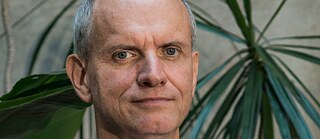Reopening Museums: European and South American Perspectives
“Our soul, our mission remains the same”

Two years ago the Museo Nacional in Rio de Janeiro fell victim to a major fire. Since then, Germany’s Foreign Office and the Goethe-Institut have been involved in the rescue work and in the development of a concept for a new museum. The Latest at Goethe spoke to the director of the museum, Alexander Kellner, about the challenges he is facing now.
By Renata Leite
The fire in Brazil’s Museo Nacional on 2 September 2018 destroyed around 20 million objects – the greater part of a collection that gathered fossils, mummies and historical objects from around the world – as well as the building that was once the residence of the Brazilian imperial family. Since the fire, Alexander Kellner, director of the Museo Nacional in Rio de Janeiro, has tried to mobilise resources and the scientific and cultural community around the world to rebuild the institution. In the present context of the pandemic, the challenge is even more complex, as the palaeontologist explains in the online panel Reopening Museums: European and South American Perspective organised by the Goethe-Institut with partners. The discussion will be streamed live in English with simultaneous translation into Portuguese on 2 September 2020 on the main YouTube-Kanal des Goethe-Instituts from 3:00 pm to 4:30 pm (CET) / 10:00 am to 11:30 am Brazilian time.
How far has the museum’s restoration and reconstruction work progressed in these two years?
Alexander Kellner: We are working quickly to return the museum to society as soon as possible and to provide an institution that can serve as a reference for other cultural institutions in the country and in South America. We have already been able to set up the necessary infrastructure so that academic work can be resumed on site, and we have made progress the reconstruction of the palace. There was a delay in planning the rebuilding project but now the plan is finished and we know what the investment will be: 20% of what Notre-Dame will cost. We will still need 200 million reals without taking the collection into account, which is one of the greatest challenges and for which we are very dependent on international aid.
What type of support does the museum need today?
Alexander Kellner: It is absolutely essential that we raise awareness among international scientific and cultural institutions so that they donate original material and help rebuild our collection. This is our main bottleneck. And we who come from Brazil have to earn these new pieces by rebuilding the palace that houses the museum in accordance with the best safety standards for the people and also for the collections. We will show the world that we have learned and that a tragedy like this will not repeat itself in our institution. We also rely on international technical assistance. There are currently no major taxidermy specialists in Brazil. When a large animal such as an elephant dies, we need tremendous agility. We are also seeking financial support from international foundations.
The fire attracted international attention. Did help arrive?
Alexander Kellner: The help offered by the German government has been extraordinary, both in terms of sharing technical expertise and with regard to finances. In an open letter, more than 26 scientific and cultural institutions in Germany recently announced their readiness to also help with the collections. Due to the large number of activities, the Goethe-Institut, which represents Germany, was invited to join one of the committees of the government project “The National Museum lives!” in which all of the reconstruction work is integrated. We will only be able to do this work with the effective support of other countries.
Alexander Kellner: Our soul, our mission remains the same. The Museo Nacional has a characteristic that clearly sets it apart from other museums and even natural history museums outside the country. We put together a collection that is not only important for understanding our culture, history and the diversity of our planet. We generate knowledge from research and we train generations of new scientists in the fields of natural history and anthropology. We also carry out scientific education activities. This will remain. The way we do it will change a little. Our big challenge is how to present ourselves inside the palace in order to astound the public and awaken the critical spirit within them. We want to present the advancement of science over time in an accessible way and show how different cultures see it differently. The museum relies on the most modern exhibition techniques in order to be able to serve everyone from children to scholars by working at the various levels to deepen each area of knowledge. We can build one of the most interesting museums in the world if we receive support.
We are experiencing an unprecedented scenario in which a pandemic is challenging the entire sector. How do you see the future of the Museo Nacional and other institutions in this new context?
Alexander Kellner: I think museums will continue to be of huge importance, perhaps even more than in the past. Our collections give us the opportunity to captivate people and make them think about science, about mistakes and successes, and about how these experiences change the course of things. These are topics that touch on issues such as the development of viruses, prevention and other measures. The dynamics of museum visits will certainly have to change, and we will have to invest a lot in digitisation. But I don’t think that the virtual can replace the magic of a work in the context of an exhibition.
The interview was conducted by Renata Leite.
